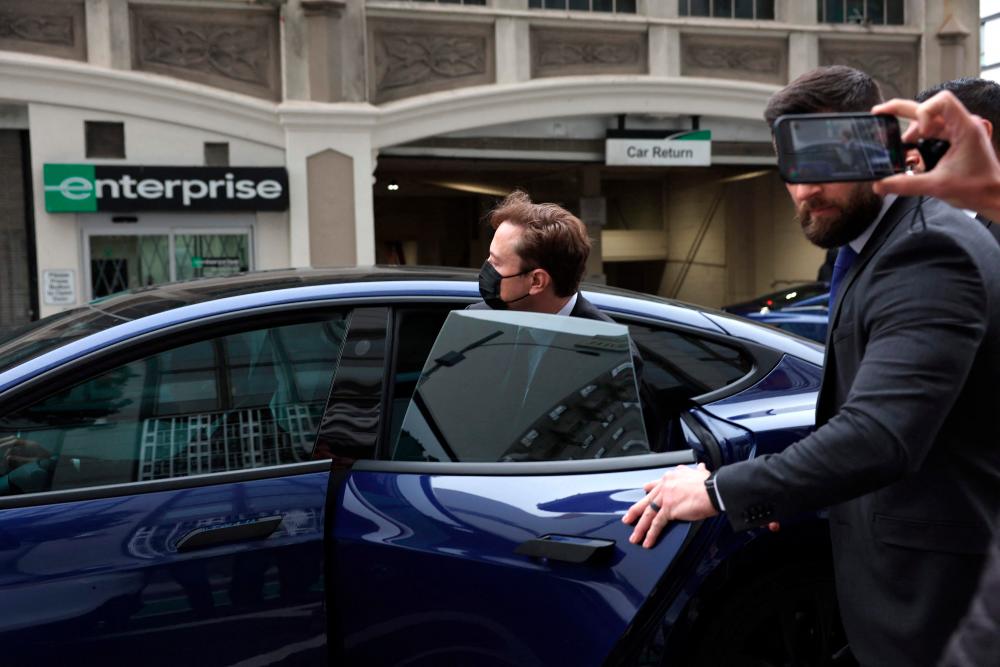SAN FRANCISCO: Jurors on Friday cleared Elon Musk of liability for investors' losses in a fraud trial over his 2018 tweets falsely claiming that he had funding in place to take Tesla private.
The tweets sent the Tesla share price on a rollercoaster ride, and Musk was sued by shareholders who said the tycoon acted recklessly in an effort to squeeze investors who had bet against the company.
Jurors deliberated for barely two hours before returning to the San Francisco courtroom to say they unanimously agreed that neither Musk nor the Tesla board perpetrated fraud with the tweets and in their aftermath.
“Thank goodness, the wisdom of the people has prevailed!” tweeted Musk, who had tried but failed to get the trial moved to Texas on the grounds jurors in California would be biased against him.
“I am deeply appreciative of the jury's unanimous finding of innocence in the Tesla 420 take-private case.”
Attorney Nicholas Porritt, who represents Glen Littleton and other investors in Tesla, had argued in court that the case was about making sure the rich and powerful have to abide by the same stock market rules as everyone else.
“Elon Musk published tweets that were false with reckless disregard as to their truth,“ Porritt told the panel of nine jurors during closing arguments.
Porritt pointed to expert testimony estimating that Musk's claim about funding, which turned out not to be true, cost investors billions of dollars overall and that Musk and the Tesla board should be made to pay damages.
But Musk attorney Alex Spiro successfully countered that the billionaire may have erred on wording in a hasty tweet, but that he did not set out to deceive anyone.
Spiro also portrayed the mercurial entrepreneur, who now owns Twitter, as having had a troubled childhood and having come to the United States as a poor youth chasing dreams.
- No joke -
Musk testified during three days on the witness stand that his 2018 tweet about taking Tesla private at $420 a share was no joke and that Saudi Arabia's sovereign wealth fund was serious about helping him do it.
“To Elon Musk, if he believes it or even just thinks about it then it’s true no matter how objectively false or exaggerated it may be,“ Porritt told jurors.
Tesla and its board were also to blame, because they let Musk use his Twitter account to post news about the company, Porritt argued.
The case revolved around a pair of tweets in which Musk said “funding secured” for a project to buy out the publicly-traded electric automaker, then in a second tweet added that “investor support is confirmed.”
“He wrote two words ‘funding secured’ that were technically inaccurate,“ Spiro said of Musk while addressing jurors.
“Whatever you think of him, this isn’t a bad tweeter trial, it’s a ‘did they prove this man committed fraud?’ trial.”
Musk did not intend to deceive anyone with the tweets, and had the connections and wealth to take Tesla private, Spiro contended.
During the trial playing out in federal court in San Francisco, Spiro said that even though the tweets may have been a “reckless choice of words,“ they were not fraud.
“I’m being accused of fraud; it’s outrageous,“ Musk said while testifying in person.
Musk said he fired off the tweets at issue after learning of a Financial Times story about a Saudi Arabian investment fund wanting to acquire a stake in Tesla.
The trial came at a sensitive time for Musk, who has dominated the headlines for his chaotic takeover of Twitter where he has laid off more than half of the 7,500 employees and scaled down content moderation. - AFP









